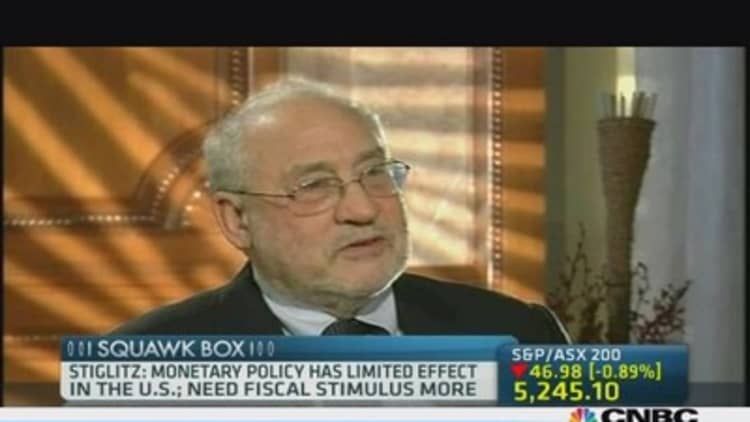
The U.S. may have shown signs of a growth pickup last year, but Nobel Prize winning economist Joseph Stiglitz remains unconvinced the economy is in recovery mode.
After years of lackluster growth, the U.S. economy started to gain traction in 2013. Growth picked up to 4.1 percent on year in the third quarter, the fastest since September 2011.
(Read More: US stocks starting off 2014 in correction mode?)
However, Stiglitz said there is still good reason to be worried about the outlook for the world's largest economy.
"The likelihood that we're going to have a really strong year, to really change where we are five years after Lehman Brothers, is very weak," he told CNBC TV 18's Latha Venkatesh in an exclusive interview.
According to Stiglitz, last week's poor U.S. jobs figures underscore such concerns.
The data showed that only 74,000 jobs were created in December, well below expectations of 200,000, creating uncertainty over the strength of the recovery, and leading some analysts to question whether Federal Reserve's decision last month to begin tapering its asset purchase program was premature.
(Read More: US profits could bounce in 2014 if economy gains steam)
"Let me say a word about that number - not only was it much less than expected, it's much less than the country needs," he said.
In addition to lower job creation, Stiglitz said a more worrying issue was the labor participation rate - the amount of people working and actively looking for work - which came in at 62.8 percent in December, its lowest level since 1978.
"We have millions who have given up looking for a job. They've looked and looked and there are no jobs...more and more Americans have said there's no future," he added.
Stiglitz also told CNBC that the Federal Reserve's massive quantitative easing program, which has seen over $3 trillion pumped into the economy since it began the process in 2008, has done little to help the domestic economy, and has been more of a global phenomenon.
"The effect in creating jobs in the U.S is very low. What we need is fiscal stimulus and that's what we're not getting," he said.
(Watch This: Has US economy turned a corner? Where do we stand?)
Last year, the much anticipated taper of the Fed's $85 billion a month asset purchase program transfixed investors for most of the year. The central bank finally moved last month, cutting purchases by $10 billion, but Stiglitz said the focus should be on the direction of interest rates, not tapering, which he described as "mild."
"They've [the Fed] said that they're going to keep interest rates at very low levels, close to zero, until the labor market improves...Given their focus on labor market, the likelihood that interest rates will rise in 2014 is very small," he added.
(Read More: Dollar bulls: Time to pack up and go home?)
— By CNBC's Katie Holliday: Follow her on Twitter @hollidaykatie

